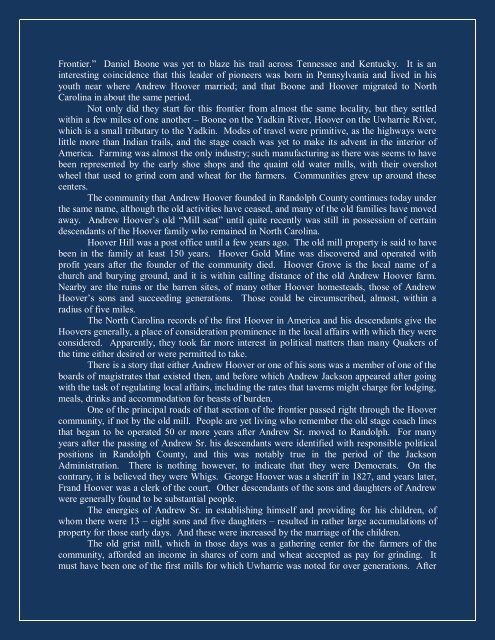A History of the Hoover Family - Mt. Pleasant Community Church
A History of the Hoover Family - Mt. Pleasant Community Church
A History of the Hoover Family - Mt. Pleasant Community Church
Create successful ePaper yourself
Turn your PDF publications into a flip-book with our unique Google optimized e-Paper software.
Frontier.” Daniel Boone was yet to blaze his trail across Tennessee and Kentucky. It is an<br />
interesting coincidence that this leader <strong>of</strong> pioneers was born in Pennsylvania and lived in his<br />
youth near where Andrew <strong>Hoover</strong> married; and that Boone and <strong>Hoover</strong> migrated to North<br />
Carolina in about <strong>the</strong> same period.<br />
Not only did <strong>the</strong>y start for this frontier from almost <strong>the</strong> same locality, but <strong>the</strong>y settled<br />
within a few miles <strong>of</strong> one ano<strong>the</strong>r – Boone on <strong>the</strong> Yadkin River, <strong>Hoover</strong> on <strong>the</strong> Uwharrie River,<br />
which is a small tributary to <strong>the</strong> Yadkin. Modes <strong>of</strong> travel were primitive, as <strong>the</strong> highways were<br />
little more than Indian trails, and <strong>the</strong> stage coach was yet to make its advent in <strong>the</strong> interior <strong>of</strong><br />
America. Farming was almost <strong>the</strong> only industry; such manufacturing as <strong>the</strong>re was seems to have<br />
been represented by <strong>the</strong> early shoe shops and <strong>the</strong> quaint old water mills, with <strong>the</strong>ir overshot<br />
wheel that used to grind corn and wheat for <strong>the</strong> farmers. Communities grew up around <strong>the</strong>se<br />
centers.<br />
The community that Andrew <strong>Hoover</strong> founded in Randolph County continues today under<br />
<strong>the</strong> same name, although <strong>the</strong> old activities have ceased, and many <strong>of</strong> <strong>the</strong> old families have moved<br />
away. Andrew <strong>Hoover</strong>’s old “Mill seat” until quite recently was still in possession <strong>of</strong> certain<br />
descendants <strong>of</strong> <strong>the</strong> <strong>Hoover</strong> family who remained in North Carolina.<br />
<strong>Hoover</strong> Hill was a post <strong>of</strong>fice until a few years ago. The old mill property is said to have<br />
been in <strong>the</strong> family at least 150 years. <strong>Hoover</strong> Gold Mine was discovered and operated with<br />
pr<strong>of</strong>it years after <strong>the</strong> founder <strong>of</strong> <strong>the</strong> community died. <strong>Hoover</strong> Grove is <strong>the</strong> local name <strong>of</strong> a<br />
church and burying ground, and it is within calling distance <strong>of</strong> <strong>the</strong> old Andrew <strong>Hoover</strong> farm.<br />
Nearby are <strong>the</strong> ruins or <strong>the</strong> barren sites, <strong>of</strong> many o<strong>the</strong>r <strong>Hoover</strong> homesteads, those <strong>of</strong> Andrew<br />
<strong>Hoover</strong>’s sons and succeeding generations. Those could be circumscribed, almost, within a<br />
radius <strong>of</strong> five miles.<br />
The North Carolina records <strong>of</strong> <strong>the</strong> first <strong>Hoover</strong> in America and his descendants give <strong>the</strong><br />
<strong>Hoover</strong>s generally, a place <strong>of</strong> consideration prominence in <strong>the</strong> local affairs with which <strong>the</strong>y were<br />
considered. Apparently, <strong>the</strong>y took far more interest in political matters than many Quakers <strong>of</strong><br />
<strong>the</strong> time ei<strong>the</strong>r desired or were permitted to take.<br />
There is a story that ei<strong>the</strong>r Andrew <strong>Hoover</strong> or one <strong>of</strong> his sons was a member <strong>of</strong> one <strong>of</strong> <strong>the</strong><br />
boards <strong>of</strong> magistrates that existed <strong>the</strong>n, and before which Andrew Jackson appeared after going<br />
with <strong>the</strong> task <strong>of</strong> regulating local affairs, including <strong>the</strong> rates that taverns might charge for lodging,<br />
meals, drinks and accommodation for beasts <strong>of</strong> burden.<br />
One <strong>of</strong> <strong>the</strong> principal roads <strong>of</strong> that section <strong>of</strong> <strong>the</strong> frontier passed right through <strong>the</strong> <strong>Hoover</strong><br />
community, if not by <strong>the</strong> old mill. People are yet living who remember <strong>the</strong> old stage coach lines<br />
that began to be operated 50 or more years after Andrew Sr. moved to Randolph. For many<br />
years after <strong>the</strong> passing <strong>of</strong> Andrew Sr. his descendants were identified with responsible political<br />
positions in Randolph County, and this was notably true in <strong>the</strong> period <strong>of</strong> <strong>the</strong> Jackson<br />
Administration. There is nothing however, to indicate that <strong>the</strong>y were Democrats. On <strong>the</strong><br />
contrary, it is believed <strong>the</strong>y were Whigs. George <strong>Hoover</strong> was a sheriff in 1827, and years later,<br />
Frand <strong>Hoover</strong> was a clerk <strong>of</strong> <strong>the</strong> court. O<strong>the</strong>r descendants <strong>of</strong> <strong>the</strong> sons and daughters <strong>of</strong> Andrew<br />
were generally found to be substantial people.<br />
The energies <strong>of</strong> Andrew Sr. in establishing himself and providing for his children, <strong>of</strong><br />
whom <strong>the</strong>re were 13 – eight sons and five daughters – resulted in ra<strong>the</strong>r large accumulations <strong>of</strong><br />
property for those early days. And <strong>the</strong>se were increased by <strong>the</strong> marriage <strong>of</strong> <strong>the</strong> children.<br />
The old grist mill, which in those days was a ga<strong>the</strong>ring center for <strong>the</strong> farmers <strong>of</strong> <strong>the</strong><br />
community, afforded an income in shares <strong>of</strong> corn and wheat accepted as pay for grinding. It<br />
must have been one <strong>of</strong> <strong>the</strong> first mills for which Uwharrie was noted for over generations. After


